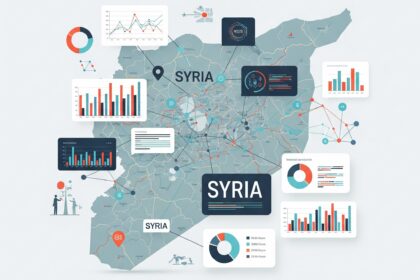
Syrian Market Analysis
Analyzing the Syrian market requires a deep understanding of the complex economic, social, and political environment. However, many researchers and companies fall into analytical mistakes that can lead to poor decisions. In this article, we highlight the most common mistakes in analyzing the Syrian market and provide practical tips to avoid them and make more accurate decisions.
1. Relying on Outdated or Unreliable Data
Mistake:
Some analysts depend on outdated or inaccurate sources, especially considering the rapid changes in the Syrian market due to the ongoing crisis.
How to avoid it:
- Use up-to-date sources, such as official reports from Syrian chambers of commerce or ministries (when available).
- Rely on local research companies like Insight Syria, which has a field team that collects fresh data.
- Always check the date of the data and avoid relying on statistics older than two years.
2. Ignoring Geographic and Social Segmentation
Mistake:
Some analysts treat the Syrian market as a single block, overlooking the significant differences between provinces (e.g., Aleppo vs. Damascus vs. eastern regions).
How to avoid it:
- Segment the market by region: analyze each province separately.
- Consider social factors such as tribal customs, demographic composition, and income levels.
- Use representative samples from each area to ensure comprehensive results.
3. Neglecting Political and Security Factors
Mistake:
Some analysts focus solely on economic factors, ignoring the impact of political and security conditions on the market.
How to avoid it:
- Monitor political developments and their influence on investment.
- Assess security risks in specific areas before expanding there.
- Consult local experts to understand the practical implications of the political situation.
4. Overreliance on Online Surveys
Mistake:
Some researchers use only online surveys, ignoring that a large segment of the Syrian market has limited internet access.
How to avoid it:
- Combine multiple methodologies:
✓ Field interviews (for offline populations)
✓ Phone calls (for business elites)
✓ Online surveys (for youth and educated segments) - Ensure all segments are represented in the research sample.
5. Misjudging Consumer Purchasing Power
Mistake:
Some analysts assume that prices in Syria are low without considering the reduced purchasing power due to inflation.
How to avoid it:
- Analyze real average income (not just official figures).
- Study spending patterns: e.g., percentage of income spent on food vs. luxury items.
- Conduct field tests to assess consumer reactions to pricing.
6. Ignoring the Informal Competition (Black Market)
Mistake:
Some analysts overlook the impact of the parallel market (smuggling, informal trade) on prices and market share.
How to avoid it:
- Track black market activities through interviews with local traders.
- Compare official and unofficial prices.
- Include analysis of illegal competition in your reports.
7. Disregarding Cultural and Religious Factors
Mistake:
Marketing strategies are sometimes developed without understanding local social and religious customs (e.g., the effect of religious holidays on purchasing behavior).
How to avoid it:
- Study shopping habits during holidays (Ramadan, Eid, etc.).
- Avoid culturally sensitive marketing content.
- Work with local researchers to understand cultural nuances.
Conclusion: How to Analyze the Syrian Market Accurately
- Use up-to-date and reliable data.
- Segment the market geographically and socially.
- Monitor political and security factors.
- Don’t rely solely on internet-based data collection.
- Analyze real purchasing power.
- Account for the impact of the black market.
- Respect cultural and religious sensitivities.
Insight Syria provides accurate analyses of the Syrian market based on scientific methodologies and fresh field data. Contact us to learn how we can help you make well-informed decisions.



